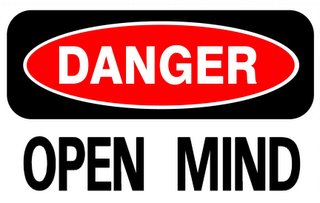 (Third Sunday of Advent (B): This homily was given on
(Third Sunday of Advent (B): This homily was given on [For the audio version of this homily, click here: Third Sunday of Advent 2005]
Philosophy professor Donald DeMarco was having a conversation with his barber recently as he was getting his hair trimmed. At one point, the topic of “same-sex marriage” came up in the discussion. The barber told Dr. DeMarco that he’s not completely comfortable with the idea of men marrying men and women marrying women, but he’s willing to go along with it because, as he put it, “I have an open mind.”
Which leads to the obvious question: Is it good? Is it good to have an “open mind”?
If you took a poll of Americans today, I think the majority would say that it is. In fact, it’s quite common these days for men and women to boast of their “open-mindedness” (especially in matters of personal morality), while at the same time pointing fingers at people like me, whom they accuse of being close-minded and hopelessly out of touch. You could say that for these “enlightened” men and women open-mindedness is the greatest of all virtues, and closed-mindedness the worst of all vices.
But is that the case?
Before I answer that question, listen to these four statements:
Two plus two equals twenty-four.
Adolf Hitler was a great guy.
Wife-beating is a healthy activity for husbands to engage in.
Murder is okay.
My brothers and sisters, do you realize that people who are intent on always being “open-minded” would not be able to say that any of those statements is false?—even though they all are!
In their commitment to being open-minded 24 hours a day, 7 days a week, 365 days a year, they would be forced to say that every one of those statements might be true!
A consistently open-minded person, for example, could never commit himself to say that two plus two equals four. He’d have to be “open” to the possibility that two plus two actually equals something else: twenty-four, forty-four, or some other number.
Nor could he condemn the evil actions of Hitler, since he’d have to be open to the possibility that “the Fuhrer” was really a nice guy, who’s been the innocent victim of 70 years of bad press.
He’d even have to be open to the possibility that wife beating and murder are morally acceptable human activities.
The logical conclusion here is that open-mindedness is fine—until you know the truth! Once you know the truth about something, open-mindedness is no longer a virtue! At that point (believe it or not) close-mindedness is the virtue and open-mindedness the vice!
It makes perfect sense, does it not? Once you recognize and accept the truth about something, you need to close the doors of your mind tightly! You need to do that in order to lock out all the errors!
For example, it’s good for a little child to be open-minded about the possibilities of what 2+2 might equal. But once he’s taught that the correct answer is 4, he needs to close the doors of his mind around that fact and shut out all the other possibilities—or someday he won’t even be able to balance his own checkbook!
It’s not wrong for someone to think Hitler might have been a good guy—until he learns the truth about what the man actually did before and during the Second World War! At that point, his mind needs to close itself around the truth that Adolf Hitler was one of the most hateful people to ever walk the face of the earth.
This is why
In a recent article he wrote, Dr. DeMarco said this: “The human mind has not completed its natural function while it remains in the state of openness. It is only when it closes itself on something true or good or right that it has completed the activity for which it was created.”
Close-mindedness, in other words, should be the ultimate goal of all our thought and reflection.
Here John the Baptist is a great role model for us. John was a man who was open to the many possibilities, until the truth was revealed to him. In the first chapter of the Gospel of John, for example, (which is the chapter today’s reading was taken from), John indicates very candidly that at first he didn’t understand that his cousin Jesus was the Messiah. He was not clear on the matter; he was open to the many possible candidates living in
Consequently, when the priests and Levites from
No!
He said, unequivocally, “I am not the Christ.”
Then he added, “I am the voice of one crying out in the desert, make straight the way of the Lord, as Isaiah the prophet said.”
Once John knew the truth that Jesus was the Messiah, the idea that he or anyone else might be the Christ was completely shut out of his mind. On that particular issue, he was as close-minded as he could possibly be.
Praise God!
So the next time someone accuses you of being close-minded on abortion, or euthanasia, or embryonic stem cell research, or “same-sex marriage,” or any other hot-button issue—specifically because you accept the teaching of the Church on the matter—take it for what it is.
Take it as a compliment!
Say to the person, “Thank you. Thank you very much! And you’re absolutely correct. I have prayed, I have studied, I have reflected, I have learned the truth about this important issue, and now my mind has closed itself around that beautiful truth. And someday, I hope and pray, you’ll have the good sense to do the same thing.”